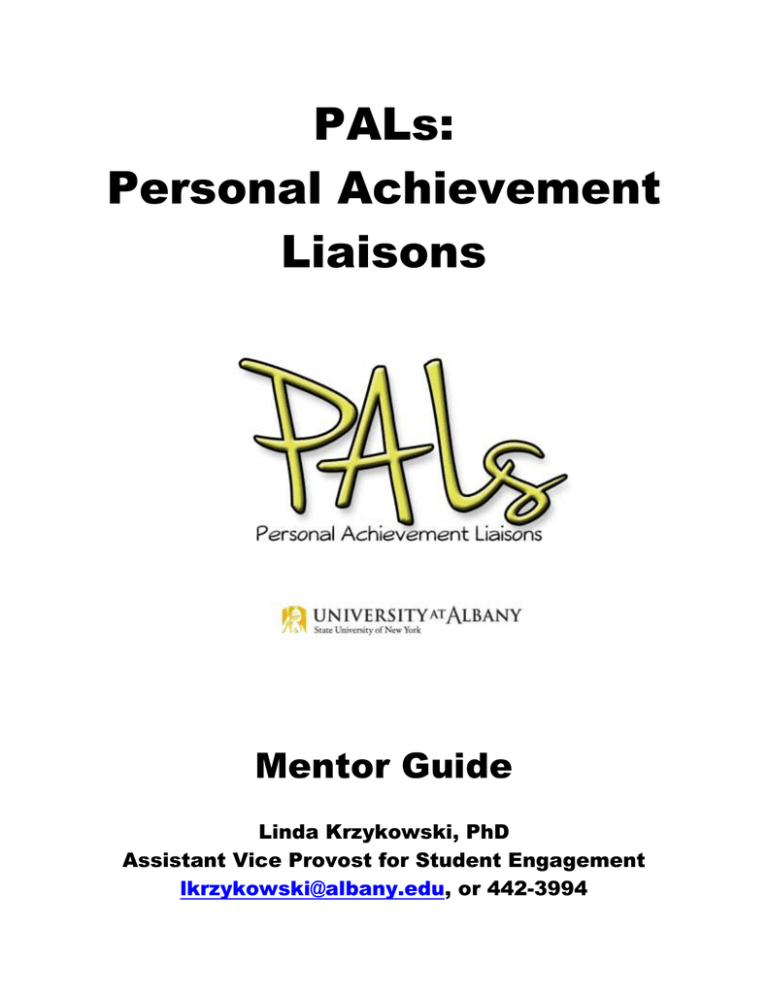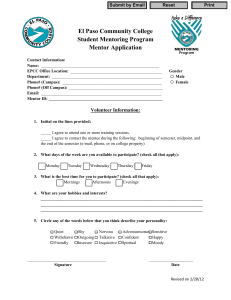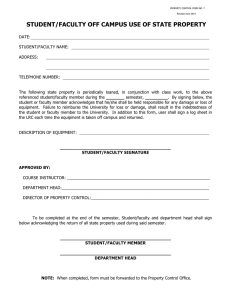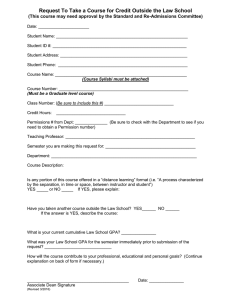PALs Mentor Handbook
advertisement

PALs: Personal Achievement Liaisons Mentor Guide Linda Krzykowski, PhD Assistant Vice Provost for Student Engagement lkrzykowski@albany.edu, or 442-3994 What is PALs? PALs is a mentoring program designed to pair new UAlbany students with faculty and staff mentors on campus. The process of starting out at (or transferring to) a new campus can be complex and overwhelming—PALs is an effort to help students avoid this stress, and feel like they are a successful member of the UAlbany community. Having a specific person to contact on campus is an often-promoted pathway to become a more engaged student, and PALs provides that opportunity. Strong academics are the central goal, but overall adjustment and satisfaction at the University are equally important. Who are the PALs mentees? PALs students are a random sampling from our newest group of incoming students. This encompasses both freshmen and transfers. We simply try to pair as many new students with PALs mentors as possible, in an effort to provide an easilyaccessed resource early in the semester. Students can also request a PALs mentor if they are not assigned one upon admission to the university. What do I need to know as a PALs mentor? PALs mentors should strive to be as knowledgeable as possible about UAlbany’s many resources and community events. Obviously, none of us are expected to memorize every program and office the University provides—but it is important to know where to get the information if you need it. We don’t want to guess at answers to their questions, and leave them jumping from office to office in search of answers. This guide provides the contact information for many resources across campus, and we encourage you to use them as necessary with your mentees. In addition, we encourage all of our PALs mentors to stay abreast of current University news and events. As you get to know your mentee, it is helpful to be able to direct them to different meetings, shows, sporting events, productions, etc. that may be of interest to them. But most of all, PALs mentors should have an enthusiasm for the UAlbany campus community. We want our new students to feel welcomed and excited to be here, and the best way we can ensure that is to reflect those feelings of excitement ourselves! Spring 2013 Timeline Early/mid-January: Receive email with mentee(s) name and contact information Email your mentee and introduce yourself January 23: Classes begin Meet with your mentee during the first ten days of the semester January 30: Last day to add classes without a permission number February 1: 1st meetings should be conducted by this date February 5: Last day to add classes with a permission number Last day to drop classes without a W Meet with your mentee before his or her first set of exams March 11: Midterm point March 27: Advance Registration for Summer/Fall 2013 begins April 8: Last day to drop a class with a W Last day to file for S/U grading May 8: Last day of classes Meet with your mentee before final exams begin May 9: Reading Day May 10: Finals begin May 17: Finals end May 18/19: Spring Commencement Summer: Email your mentee to encourage him or her to return to UAlbany in the fall! Finding a Start Point Your first mentor/mentee meeting You should have your first meeting with your mentee within the first 10 days of class. You should initiate first contact via email/phone. Start with the basics. o Major? Minor? Who is their advisor? o Hometown? o Extracurricular interests/jobs? o Feel free to share about yourself as well. How can they benefit from a PALs mentor? o Ask open ended questions to get the best answers. Why did they choose UAlbany? What are they looking forward to about the transition? What are the 3 most important things they want to acheive this semester? Do they have a plan in place for success? What factors might keep them from succeeding this semester? What is their greatest fear this semester? What personal strengths will help them academically and personally? How can you, as a mentor, assist them best with their goals? Create an overall term plan o Have the mentee bring their syllabi for each course, to identify more difficult parts of the term (papers, exams, etc) o Talk about early plans to prepare for those busier periods Establish a general schedule for checking in throughout the term Potential Academic Issues to Expect Time Management o Daily, monthly, and semester-long planning o Common distractions—how can they be avoided? o Using technology to help, not hinder Classroom Preparation o Attendance o Staying on top of readings o Asking questions and using office hours Organizational Skills o Study space vs living space o Paper organization vs computer-based organization o Connecting to schedules/calendars (see time mgmt.) o Best tools/apps/etc? Note Taking: what strategy is best for them? o Taking notes while reading o Flashcards o Highlighting o In class: how to take notes efficiently o Learning not to rely solely on Powerpoint slides Study Tips o Establishing a good “study place” o Who do they study with? o Campus resources: Advising PLUS, CARSS, Writing Center, Math tutoring, etc. Understanding Academic Standing Even though all PALs mentees are new students, it is important to be aware of the various levels of academic standing, in case students find themselves in a difficult academic situation. Academic Warning: A student whose semester grade point average falls below a 2.00 (but is a 1.0 or above) will receive an Academic Warning from the Office of the Vice Provost for Undergraduate Education. This action will not subject the student to any further penalty but is intended to remind the student of the University’s policies as well as to inform the student of the resources available to ensure good progress in achieving an undergraduate degree. Academic Probation: A student whose cumulative grade point average falls below a 2.0 will be placed on Academic Probation for the following semester. Students on Academic Probation will be expected to improve their academic performance immediately. They must raise the cumulative GPA to at least 2.0 to be removed from academic probation. Students who fail to meet this condition will be placed on Terminal Probation in the following semester. Terminal Probation: A student will be placed on Terminal Probation for the semester if either of the following occur: the student’s semester GPA is below 1.0, or the student has a cumulative GPA below 2.0 for a second semester Students on Terminal Probation for a semester are in danger of academic dismissal at the end of that semester. Therefore, as a condition of continuing their enrollment at Albany, they must complete an “Academic Improvement Plan” (AIP) in consultation with their academic advisor, and must file this plan with the Office of the Vice Provost for Undergraduate Education by the date designated on the AIP. (Failure to file this form could result in a hold on the student's record). If the student achieves a semester GPA and cumulative GPA of at least 2.0, the student will be removed from Terminal Probation. If the student’s semester GPA is at least a 2.0 but the cumulative GPA remains below 2.0, the student will remain on Terminal Probation and must continue to meet the conditions described in section 2) above. The student must raise the cumulative GPA to at least 2.0 to be removed from Terminal Probation. If the student earns a semester GPA below a 2.0 while on Terminal Probation, the student will be dismissed. Potential Personal Issues to Expect Homesickness o Connections to home can make it hard to enjoy time at UA o Learning to cope with long-distance family/friend/romantic relationships Struggling to Get Involved/Find Friends o Unsure where to begin o Difficult to jump in if student is shy/reserved o If starting in spring semester, may feel like everyone else already has friend groups Financial Worries o Balancing school with job responsibilities o May have financial responsibilities for their families o Some students may be financing education themselves o Must create realistic expectations for workload Roommate Issues o For many, this is their first shared rooming experience o Unsure how to approach roommates when problems arise o Make sure they understand who to contact for assistance (RA, RD, etc) Physical Health Concerns o Pre-existing or newly diagnosed—need to make sure they can figure out the best way to get treatment o University Health Center: 442-5454 o Disability Resource Center: 442-5490 Depression/Anxiety/Other Mental Health Concerns o Students with pre-existing conditions may need help making sure they get connected to proper treatment o Other students may be newly discovering these issues o Important to get them connected to the University Counseling Center (442-5800) Semester Calendar of Common Concerns (from http://dsa.uconn.edu/huskiesawayfromhome/calendar_issues.html) September Homesickness - especially for freshmen. Roommate conflicts caused by personality differences, lack of understanding and unwillingness to compromise or the new experience of having to live with someone. Initial adjustment to academic environment - feelings of inadequacy and inferiority develop because of the discrepancy between high school status and grades and initial college performance. Class size, especially in mass lecture halls, lack of personal interest by professors and performance expectations are also major factors. Values exploration - students are confronted with questions of conscience over conflict areas of race and alcohol experimentation, morality, religion and social expectations. New social life adjustments - including new freedom of not having to check with parents about what time to be in, having the opportunity to experience new areas, making your own decisions on when to conduct social activities and establishing yourself in a peer group. Initial social rejections - creates feeling of inadequacy when not immediately accepted in a peer group, or into a social sorority or fraternity. "En-loco parentis" (without parents) problems - students feel depressed because of real or perceived restrictive policies and regulations of the college. Campus familiarization - includes becoming familiar with campus, classrooms, buildings and meeting places. Long distance relationship - torn between being loyal to your significant other from home and going out with new people. Can the expectations of both people be adequately met? Financial adjustment - involves adjusting to a somewhat tighter budget now that they are in school as opposed to when they were living at home. Students who are supporting themselves have to adjust to budget their money properly. International student adjustment - experience a sense of confusion, vulnerability and a lack of any advocate in higher positions while trying to make a successful cultural and academic transition. Family problems seem amplified because the student may either be caught in the middle, relied on for the answer or because they are far away, feeling helpless in helping reach a solution. Adjusting to "Administrative Red Tape" with students soon realizing that it may be a long and frustrating process when trying to find an answer to what seems to be a simple question, or trying to work something through the administrative process. October Academic stress from midterms builds with the great demand for studying and preparation. For some students this may be their first exam of the semester. For many, the midterm workload pressures are followed by feelings of failure and loss of self-esteem. Roommate problems continue, but they are smaller in scope than previous months. Values exploration continuing, especially in the area of sexuality. Dating/non-dating/friendship anxieties extremely high. Non-dating students feel a sense of loss of esteem because so much value is placed upon dating. For women who do date, the pressure to perform sexually increases and consequently increases feelings of rejection, loneliness and guilt and in some instances leads to unwanted pregnancies. Homesickness may still be felt by a number of students. Job panic for mid-year graduates starts with the onset of resume preparation and interviewing. Students decide to withdraw from school because they either realize that college is not the place for them, they return home for personal reasons or they transfer to another school. Grief from not being part of a group develops because of inadequate skills for finding a group, or from not being selected by one. Financial strain sets in from lack of budgeting experience. Graduate school syndrome starts to emerge from graduating seniors. Signing up for graduate school exams, wondering if you will be accepted, wondering which school to apply to and questioning whether graduate school is the right thing to do. Time conflicts between academic and social expectation emerges. Signing up for classes involves starting to think about the following semester Adjusting to new study habits includes not just being able to study the way they did in high school. More time and greater workload needs to be incorporated into their schedule for studying. Disenchantment with school - low reward level because student begins to realize that life at college is not as perfect as they were led to believe by parents, teachers and counselors. Old problems seem to continue and new ones are added. An external reality they had put their hopes in has failed them. November Increasing thoughts of depression occur from inability to cope with the pressures of academic and social expectations. Academic pressure begins to mount because of procrastination, difficulty of work assigned and lack of ability. Pre-finals stress starts to emerge as preparation begins for taking the exams. Time management conflicts continue. Social apathy causes frustration because of academic pressures. Depression and anxiety increase because of feelings that one should have adjusted to the college environment. Economic anxieties increase because funds from parents and summer earnings begin to run out; loans become due. Problems develop due to increased alcohol consumption because students see this as an easy, acceptable way to relieve stress and from not knowing how to handle alcohol responsibility. Roommate problems may start to emerge again. This is mostly due to the pressure of school; tempers become shorter and people are less tolerant of others. Deteriorating health starts to affect performance. Reasons include the changing weather and either lack of food quality or the negative feelings about institutional foods. Health is also affected by the perceived inadequacies of the student health center. Students have given up making attempts to establish new friendships beyond two or three parasitic relationships. Living unit dissension causes uncomfortable feelings with residents, resulting from apathy, academic pressures, need for vacation from school. December Final exam pressures including anxiety, fear and guilt increase as exams approach and papers become due. Increased use of alcohol and drugs is related. Extracurricular time strains - seasonal parties, concerts, social service projects and religious activities drain student energies. Financial worries occur with the thought of holiday gifts and travel costs. Pre-holiday blues emerges, especially for those who have concerns for family, those who have no home because of family conflicts. Friendship tensions become high with the onset of final exams. Pressure increases to perform sexually because of the approach of vacation and the extended separation. January Anxiety about second semester performance begins since they may not have done as well as expected the previous semester, and they have added pressure of doing well to be able to stay in school or to keep grades competitive with their peers. Some students lose a loved one, a friend or significant other by death over the break and they find it hard to share the happiness and joy others experienced over the break. Moving to a new environment causes feelings of intrusion because students move onto a unit where most of the friendships have been established, priorities set and expectations understood. Unfamiliarity with campus also creates some anxiety. Money problems begin because students were unable to find jobs over the holiday break. Post-holiday depression occurs at the beginning because students are away from the security and positive strokes. Some students experience unwanted weight gains over the break with the holiday foods and home cooking. Reincorporating social and academic life is difficult at first with not having to worry about school for an extended period. February Hourly exams and other academic pressures approach. Depending upon the weather, some people will experience cabin fever if the weather forces them to stay inside for a lengthy period of time. With the lack of organized activities to compensate for this, anti-social behavior sometimes occurs, such as excessive property damage. Vocational choice anxieties set in with the onset of job interviews. Worry of hunting for a summer job begins. This is especially high for students who were unable to find work during the Holiday break. Relationship anxieties increase as either couples begin to strengthen their ties (engagement) or experiencing weakening relationships. Fall housing planning begins with trying to tentatively decide about living arrangements. March Academic pressures increase with the approach of mid-term exams. With the pressures of the end of the semester approaching, many students start to increase their use of alcohol and drugs. This can cause them any problems, both biologically and behaviorally. Existential crisis for seniors - Must I leave school? Is my education worth anything? Was my major a mistake? Why go on? Living arrangement anxieties occur with the forcing of decisions - Should I move out? Live in the same building? Stay with the same roommate? Will a friend be left out of the plan? Summer job hunting will be heavy over spring break. Worry about finding a job or not finding one will cause severe anxiety. Trying to find money to use for spring break is a problem, especially when your peers are going to a place other than home and you are not able to join them. April Academic pressures increase with the end of the semester approaching. With nicer weather, women fear the threat of sexual assault. Summer job pressures continue. Senior job recruitment panic continues. Financial strain from spring break affects social life. Many students are forced to select a major and are not sure what field they would like to enter. Social life pressures increase during this time period - formal dances, parties, concerts. With spring arriving, everyone wants to fall in love. Many students go through rejection or the fear of rejection or envy towards their friends who have successfully found a significant other. Frustration from being ill because weather changes so dramatically. Causes colds, lethargic feelings and limits their social commitments. As the pressures build, students tend to become disenchanted with many normal services and food service is the primary target. They tend to get tired of eating "the same old" institutional food. May/June Anxiety develops because of the realization that the year is ending and a deficiency in a number of academic areas still exists. Finals pressures are at a critical level with papers, take-home exams and studying. Some of the major effects of the pressure include: increased use of coffee, no-doz, vivarin, and amphetamines; and increase or decrease in alcohol consumption. Less sleep and a lower tolerance level with friends/peers. Senior job panic about employment (or lack of) increases as well as trying to determine how to finance oneself until the first paycheck arrives. Summer job pressures increase for those who have not yet found one. Anxiety for couples who will be separated for the summer. Also, the fear that their significant other will find someone else while they're apart. Depression over having to leave the friends and people they have grown close to during the school year. Anxiety of having to go home after having been independent the past year, especially if they are having conflicts with their parents. University Offices Know your campus! Advising PLUS (LI-36, under the main library—Barbara Brown, Advisement Services) Study groups available for specific courses each term General advisement groups with ASC advisors Peer mentoring Review sessions with professors and TAs before large course exams Support for specific groups (computer science, international students, etc) Individualized counseling on academic issues Office of Access & Academic Enrichment (LI-94, under the main library) Home of Project Excel, CSTEP, and STEP programs Study skills workshops, counseling, tutoring, etc. (some dependent on eligibility) Center for Achievement, Retention, and Student Success (CARSS) (LI-70) Academic support for students in science, technology, engineering & math fields Free peer tutoring in many science courses Mathematics Department Tutoring (ES 138) Daily drop-in tutoring in 100 level math courses Office of International Education (Science Library first floor) Support for international students on academic and non-academic issues Advisement Services Center (LI-36, under the main library) Make sure they know their advisor! Walk-in hours GPA calculator: http://www.albany.edu/advisement/Newsite/gpa.html Office of Undergraduate Education (Lecture Center 30) Absence notes “Late” actions/exceptions: dropping a class, filing S/U, etc. past the deadline General Education substitutions Transfer credit issues (gen eds/electives) Writing Center (HU 140) Assist students with writing assignments of all kinds Not “proofreaders”—they assist with the entire writing process Private hour-long tutor sessions Discuss issues of content, organization, clarity University Libraries Assistance with researching for papers, projects, etc Variety of hardware, software, and multimedia resources Small study rooms available for group study/projects Disability Resource Center (Campus Center 137) Assistance for students with disabilities (learning, physical, etc.) Student Services Center (basement of Campus Center, near Wendy’s) Student Financial Services Student Accounts Financial Aid University Counseling Center (400 Patroon Creek Blvd, Suite 104) Individual counseling: 442-5800 Educational programs Sexual Assault Resource Center Middle Earth (peer counselors): 442-5777 Project SHAPE Residential Life (State Quad U-Lounge—though you will often refer to RA/RD/QC first) Roommate issues Housing questions They should be familiar with their RA/RD Career Services (Science Library, first floor) On Campus Recruiting Mock interviews Cover letter help Graduate school/job searching UA Career Path to search for jobs/internships Office of Student Involvement and Leadership (Campus Center 130) Student clubs/organizations MyInvolvement.org Greek Life Intramural sports Multicultural student success Final things to remember… Meet with students early. Be assertive and follow up if a meeting is missed. Don’t give up! It is critical to establish contact as early as possible…within 10 days of the first day of class. Be honest and straightforward with students. Sometimes you can be their “reality check”. Stay on top of your students, but realize that they need to want to help themselves too. Every student is different and requires different support, methods, etc…but a lot can also remain constant. Become familiar with University processes. Mentors need to be student-oriented and persistent. Don’t be afraid to ask questions/negotiate a referral if you’re uncertain about something. Listen. Let them know you care. Give them lots of encouragement. Keep connected; you will probably know they need you before they know. Be yourself!



